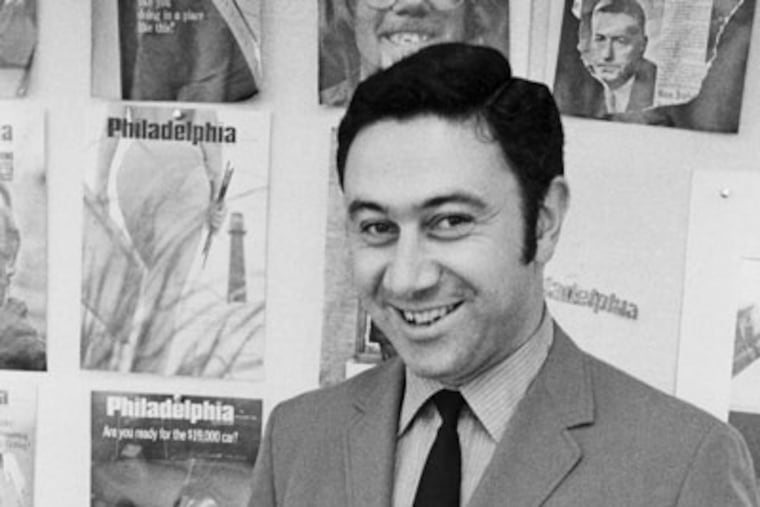Gaeton Fonzi, 76, reporter who wrote of JFK's killing
Gaeton Fonzi, 76, an investigative reporter for Philadelphia Magazine from 1959 to 1972 who later published his own conspiracy theory of the 1963 assassination of President John F. Kennedy, died Thursday, Aug. 30, of Parkinson's disease at his home in Satellite Beach, Fla.

Gaeton Fonzi, 76, an investigative reporter for Philadelphia Magazine from 1959 to 1972 who later published his own conspiracy theory of the 1963 assassination of President John F. Kennedy, died Thursday, Aug. 30, of Parkinson's disease at his home in Satellite Beach, Fla.
"He was relentless," D. Herbert Lipson, chairman of Metrocorp, owner of Philadelphia and Boston Magazines, recalled.
That intensity carried on after Mr. Fonzi left Philadelphia.
"His whole obsession was the Kennedy assassination," Marie, his wife of 55 years, said.
"He was in constant contact with everybody about that" for years, she said. "He went and spoke in Dallas almost every year" at gatherings where the assassination there was discussed.
Mr. Fonzi was an investigator for the Senate Select Committee on Intelligence from 1975 to 1977 and for the House Select Committee on Assassinations for two years after that, his wife said.
His book on the matter, The Last Investigation, was published in 1993 by Thunder's Mouth Press.
Born in Philadelphia, Mr. Fonzi graduated from the University of Pennsylvania in 1957, where he wrote for the campus newspaper, the Daily Pennsylvanian.
Mr. Fonzi was briefly a reporter at the Delaware County Daily Times before serving Stateside as an Army infantry officer.
He joined what was then Greater Philadelphia magazine, a publication for business executives, in 1959 and helped turn it into a trendsetting publication.
"My father was one of the owners," Lipson said. After the elder Lipson left in 1960, he said, "I was a brash, precocious kid who made the changes that really began around '60."
Mr. Fonzi, Lipson said, "was there in the beginning with me."
Working closely with editor Alan Halpern, "he did a lot of great stuff" that wasn't being covered by the region's newspapers.
"In those days, we wanted to cure all the ills of the world," Lipson said, and "it could take him years" to gather enough to finally publish an investigation.
For instance, in the years before The Inquirer was bought by what became the Knight-Ridder chain of newspapers and made into a nationally acclaimed newspaper, Mr. Fonzi discovered that one of its reporters, Harry Karafin, had a questionable sideline.
Mr. Fonzi and fellow magazine reporter Greg Walter "authored a lengthy piece accusing Harry J. Karafin of having extorted money from his subjects in exchange for not publishing stories about their misdeeds," The Inquirer reported in Mr. Walter's 1989 obituary.
"It was a piece that led to Mr. Karafin's indictment and imprisonment."
Gil Spencer, the late top editor at the Philadelphia Daily News, said in that 1989 story that Mr. Walter and Mr. Fonzi "were the first to turn regional magazines into investigative instruments.
"And it certainly hit Philadelphia for a real lick, as far as investigative reporting went at that time."
Bernard McCormick, a fellow reporter at Philadelphia Magazine, wrote in a recent appreciation that Mr. Fonzi's "gentle, slow talking, sometimes inaudible manner belied his aggressive journalistic style.
"He joked that his mumbling, halting interview technique worked to his advantage when subjects couldn't stand his pace and blurted out information."
After Philadelphia, Mr. Fonzi joined McCormick as editor and part-owner of Miami magazine before going on to the congressional committees.
Mr. Fonzi then contributed to Gold Coast magazine, part of the Gulfstream Media Group, where McCormick is publisher.
Mr. Fonzi's wife said Sigma Delta Chi, the Society of Professional Journalists, gave him two local awards and a national award.
He ran three marathons, the last when he was in his 50s, said his wife, also a marathoner, whom he met at Penn.
But apart from his investigative work and his family, she said, "his sailboat was his greatest love," a 37-footer that he moored on Biscayne Bay from 1977 to 2002.
In addition to his wife, Mr. Fonzi is survived by sons Guy and Christopher; daughters Irene Fonzi and Maria Fonzi-Gonzales; eight grandchildren; and two great-grandchildren.
A Funeral Mass was set for 11 a.m. Tuesday, Sept. 4, at Holy Name of Jesus Church, 3050 N. Highway A1a, Indialantic, Fla., with a 1 p.m. luncheon reception at City Tropics Bistro, 249 Fifth Ave., Indialantic.